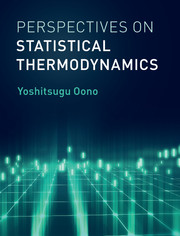Book contents
- Frontmatter
- Dedication
- Contents
- Preface
- Acknowledgements
- Self-Study Guide
- List of Symbols
- Part I Atomic and Mesoscopic Viewpoint
- Part II Statistical Thermodynamics: Basics
- 11 Macrosystems in Equilibrium
- 12 Thermodynamic Description
- 13 Basic Thermodynamics
- 14 Thermodynamics: General Consequences
- 15 Entropy Through Examples
- 16 Free Energy and Convex Analysis
- 17 Introduction to Statistical Mechanics
- 18 Statistical Mechanics of Isothermal Systems
- 19 Canonical Density Operator
- 20 Classical Canonical Ensemble
- 21 Information and Entropy
- 22 Information and Thermodynamics
- 23 Oscillators at Low Temperatures
- 24 How to Manipulate Partial Derivatives
- 25 Thermodynamic Stability
- 26 Fluctuation and Response
- 27 Chemical Potential
- 28 Grand Canonical Ensemble
- 29 Ideal Quantum Systems at Low Temperatures
- 30 Photons and Internal Motions
- Part III Elements of Phase Transition
- Appendix Introduction to Mechanics
- Bibliography
- Index
12 - Thermodynamic Description
from Part II - Statistical Thermodynamics: Basics
Published online by Cambridge University Press: 24 November 2017
- Frontmatter
- Dedication
- Contents
- Preface
- Acknowledgements
- Self-Study Guide
- List of Symbols
- Part I Atomic and Mesoscopic Viewpoint
- Part II Statistical Thermodynamics: Basics
- 11 Macrosystems in Equilibrium
- 12 Thermodynamic Description
- 13 Basic Thermodynamics
- 14 Thermodynamics: General Consequences
- 15 Entropy Through Examples
- 16 Free Energy and Convex Analysis
- 17 Introduction to Statistical Mechanics
- 18 Statistical Mechanics of Isothermal Systems
- 19 Canonical Density Operator
- 20 Classical Canonical Ensemble
- 21 Information and Entropy
- 22 Information and Thermodynamics
- 23 Oscillators at Low Temperatures
- 24 How to Manipulate Partial Derivatives
- 25 Thermodynamic Stability
- 26 Fluctuation and Response
- 27 Chemical Potential
- 28 Grand Canonical Ensemble
- 29 Ideal Quantum Systems at Low Temperatures
- 30 Photons and Internal Motions
- Part III Elements of Phase Transition
- Appendix Introduction to Mechanics
- Bibliography
- Index
Summary
Summary
* A phenomenological description of macroscopic systems is a description solely in terms of quantities observable and controllable at the macroscopic scale.
* A macrosystem in a certain constant environment can be in a time-independent state called the equilibrium state.
* An equilibrium state is described in terms of thermodynamic coordinates consisting of internal energy and work coordinates.
Key words
phenomenology, equilibrium state, thermodynamic coordinates, work coordinates, thermodynamic space, quasistatic process, state function
The reader should be able to:
* Explain what an equilibrium state is.
* Explain why the thermodynamic coordinates are privileged coordinates.
* Explain what the thermodynamic space is and what the state functions are.
Can we have a theoretical framework to systematize empirical facts of macrosystems without referring to microscopic details?
What is Phenomenology?
A phenomenological description of macrosystems is a description solely in terms of quantities that may be observed, controlled, and described at the macroscopic scale. If we could make a closed (complete) system of theory in terms of such quantities, the result is called phenomenology.
The phenomenology of macroscopic systems in equilibrium (see 12.2) we now have is called thermodynamics. The reader must clearly recognize that, in contrast to (the supposedly more fundamental) statistical mechanics, thermodynamics survived the quantum revolution unscathed; and it actually helped launch the revolution. Quantum mechanics has no problem with thermodynamics (for now), but even if quantum mechanics is replaced by something else in the future, thermodynamics will remain intact.
In physics, “phenomenology” has not necessarily been respected; it could almost be a pejorative (e.g., in high-energy physics). However, notice that when underlying microscopic descriptions are impossible or only approximate, phenomenology may be the only realistic rational means for human beings to grasp the world. As we will see soon, thermodynamics correctly captures a certain universal feature of the macroscopic world which is quite insensitive to the microscopic details. A phenomenology is not an approximate way to understand the world nor a crude version of something more accurate; thermodynamics is not an approximation to a certain more advanced and accurate theory. Perhaps, intelligent beings could emerge only in such worlds that allow phenomenological descriptions.
However, one may well claim that as an empirical science, quantum mechanics is much more precisely validated than thermodynamics.
- Type
- Chapter
- Information
- Perspectives on Statistical Thermodynamics , pp. 133 - 141Publisher: Cambridge University PressPrint publication year: 2017



